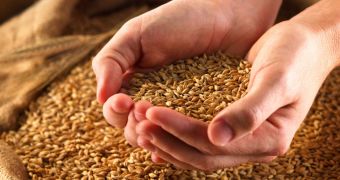In a paper published in the journal Proceedings of the National Academy of Sciences this past Monday, a team of researchers argues that, as surprising as this may sound, getting animals to eat more grain might actually help reduce the ecological footprint of raising livestock.
In this report, specialists explain that, according to recent estimates, the global demand for animal products has high chances to double by the year 2050.
This is bound to happen due to the fact that, especially in developing countries, the demand for meat is rising at a fairly rapid pace.
According to NPR, the world's livestock industry is already to blame for about 12% of global greenhouse emissions, and is therefore a contributor to climate change and global warming.
What's more, 30% of our planet's surface presently supports, in one way or another, this growing industry, the same source details.
It goes without saying that, if said predictions are true, the ecological impact of raising livestock will surely go from bad to worse in the years to come.
Researchers argue that, in order to keep the livestock industry's ecological footprint from further expanding, measures must be taken to limit the surface of land needed to support it.
They say that, as shown by a series of studies, this can be achieved by getting animals to eat more grain.
As detailed in the paper in the journal Proceedings of the National Academy of Sciences, it would appear that many of the animals raised by humans in poor regions of the globe currently eat just grass.
This does not a sustainable use of land make. Besides, studies have shown that animals that chiefly feast on grass actually generate more greenhouse gas emissions per pound of meat produced than those that get to eat grain.
Thus, encouraging farmers to produce livestock more efficiently and making the idea to snap up new land to graze animals less appealing might actually help reduce greenhouse gas emissions just as much as – maybe even more than – promoting vegetarianism would.
Otherwise put, the solution to being able to eat meat while protecting the planet appears to be limiting land-use change by helping farmers become more productive.
“If we're able to develop policies to become more efficient producers of these products, we can continue to meet demand while reducing emissions,” says Rich Conant, an ecosystem ecologist at the Natural Resource Ecology Laboratory at Colorado State University.
Furthermore, “We already know there are lots of things producers can do on the farm, and there's a lot of research going on how they can more effectively manage the herd, to how they can get more meat from the animals, to how they manage the waste.”

 14 DAY TRIAL //
14 DAY TRIAL //